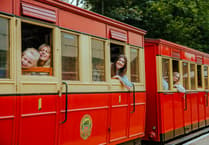In the summer of 1944 Kathleen Oates - a Wren assigned to the Women's Royal Naval Service during the Second World War - was transferred to the Isle of Man. During her time on the island, she wrote dozens of letters to home which provide a unique commentary on the operations at Ronaldsway and what life was like on the Isle of Man 80 years ago. Her daughter, CHRISTINE SMITH, pores through her mother’s letters as part of a series of columns based on Kathleen Oates’s writing...
Eighty years ago last week, Kathleen Oates returned from spending Christmas in Leicester with her family. She travelled to the Isle of Man via Liverpool, where she had previously been stationed – and where she was able to touch base with old contacts and friends.
In Liverpool, there appeared to be a scheme in which local people could volunteer to offer a “home from home” to young people in the armed forces, and Kathleen had become very friendly with a kindly older couple there, with whom she often stayed on weekends. She visited them on her return to the Isle of Man and reported on the food situation: ‘I had two eggs whilst I was at Mrs Muir’s and half a grapefruit. They’ve had lots in Liverpool’. She also contacted Gladys, a Wren friend at her old place of work, but they were unable to meet because of a compulsory Make and Mend session, followed by a lecture on “Careers for Women After the War” given by a First Officer. This prompted Kathleen’s own thoughts on the matter: ‘I’m still thinking about teaching, though the thoughts of it are quite distasteful, though I suppose it’s about the best thing I can do’. Kathleen reported Gladys’s complaints – ‘The N.A.T. [Night Attack Training – Kathleen’s previous post] sounds worse than usual – plenty of scrubbing and cleaning and strict discipline. They have quite a lot of ship’s parties to counteract that, though’.
Her crossing back to the Isle of Man was as interesting as it had been in mid November because the ferry ‘took some German prisoners across with us – there were several officers amongst them’. Kathleen didn’t comment further on this novelty, possibly because Yorkshire cousins had first Italian and then German POWs working on their farm and the family probably would have discussed these in detail. Decades later, her cousin recalled his fondness for the friendly Italians and the immaculate manners of the Germans. In a letter to Kathleen that month, mum Elsie also mentioned seeing Italian Prisoners of War clearing the snow from Leicester streets.
Once back at camp, Kathleen had more than just unpacking tasks in the cabin. ‘I didn’t actually feel homesick when I came back, though I missed a nice warm room and comfy bed. The cabin was terribly cold and I had to make my bed up with clean linen as we always have to strip them when we go on leave. I grumbled to myself about the WRNS and wished I was out, but I realise that was only post leave depression!... It already seems a long while since I was at home, although I expect the next 4 months will go by quickly.’
There was news when she got back – one of the Janes had got engaged over the Christmas period. However, Kathleen was sceptical: ‘that’s another one I don’t think will last – a week or so ago, her sole interest in like was a Petty Officer who has now gone on draft’. The “easy come, easy go” nature of many wartime romances among the forces was a theme in Kathleen’s letters home, possibly making her reluctant to follow suit. She had also just received a letter from a Liverpool Wren, speaking of her fiancé breaking off their engagement due to differences in temperament – ‘another engagement which I didn’t think would last’.
But scepticism didn’t stop Kathleen celebrating with Jane: ‘She treated us to supper in Castletown and then we went to a dance at the local YMCA and had quite a good time’. However, soon after, on January 17 came the news that ‘Jane didn’t feel too good and at the moment she is reposing in sick bay with a rash – suspected measles! She feels okay but has this awful rash – if it’s measles, she’ll be sent to Douglas as we don’t keep isolated cases here in Castletown. I popped a letter to her yesterday as I couldn’t see her.’

On a more positive note, Kathleen had finally managed to engineer a transfer to the camp where she had long wanted to be. ‘Before anything else, please note my address. I have at last moved down to Castletown camp. A bunk in the Janes’ cabin was vacated – so I went to see the officer and have moved down. Although I liked Scarlett, Castletown is the main camp where the cinema is and it’s much more central and convenient for everything. This is the sixth cabin that I’ve lived in since coming to the Isle of Man!’
A final letter on January 20 announced that ‘Jane is in Sick Bay with measles and there she has to stay for three weeks! It’s terrible really as she doesn’t feel at all ill. All the remainder of the cabin – myself included – have to report to Sick Bay every day to be inspected for spots! So far we’re all clear – so I’m hoping for the best! I don’t want any more time in sick bay yet!’ – Kathleen was referring to the 2 weeks she spent there in November, fighting a virus.
In fact, she was seeing more of Sick Bay than she would like, and grumbled, ‘It’s squad drill tonight – another Navy nuisance! Then we’ve all got to go to Sick Bay for the two monthly head inspection – in spite of the fact that we went after returning from leave!’.
On a positive note, Kathleen was less stretched at work, compared to before Christmas. ‘At the moment, Cynthia and I have been taken off night flying, so we’re now having a very easy time working a morning one day and an afternoon the next! This is fine, but I don’t expect it to last. I think they’re giving us a rest after our doing it so extensively while the other person was on leave. It certainly isn’t because we don’t know the job, because Lieutenant Commander Wellington said we knew more about it than the other officers… I’m quite content – if I hadn’t such an easy time here, I’d try harder for a draft back to the Navy.’
But the work/leisure balance was a difficult one when it came to keeping her happy: too much leisure and she became bored. She commented that she would have loved all the free time in Liverpool! “Last night, I went to the camp cinema and tonight I’d like to go dancing at the YWCA if any of the girls will go. I’m rather tired of staying in and leading a quiet life always. It’s immediately outside the camp gates. It won’t be very exciting but it’s something to do.’
Family news arriving in that week included mum Elsie thanking Kathleen for the birthday present of a book, and commenting that another present of a silk handkerchief was most definitely not the same quality as pre-war. To celebrate, she made a chocolate cake instead of the traditional family fruit cake, as ‘I haven’t made any for such a long time – it takes too much sugar’. Sister Dorothy wrote of attending a 21st birthday party in which she drank what sounded like her first cocktail: ‘worse than any nasty medicine, so steer clear during wartime’. Father Chris assured Kathleen that they were regularly tuning in to the Navy Mixture programme on the BBC General Forces Programme [which ran from 1944 to the end of the war, designed for both British and American forces and also the civilian “Home Front”], as they wanted to keep up with such news in order to feel closer to her.
Kathleen’s last letter of the week ended on an appreciative note. “I have enjoyed this afternoon – it’s been absolutely lovely! When it’s not stopped snowing, the sun came out again – and the clouds were a picture – almost mauve, against a grey sea and white shore. I watched a Yankee Fortress flying round the ‘drome – finding his bearings and eventually deciding to land. I expect he was landing because of bad weather ahead – he came down beautifully. - This place is really a picture. I always feel that I must drink in its beauty – in case I’m suddenly whisked away back to cities and streets and the drabness of Lancashire’s country!’




.jpg?width=209&height=140&crop=209:145,smart&quality=75)